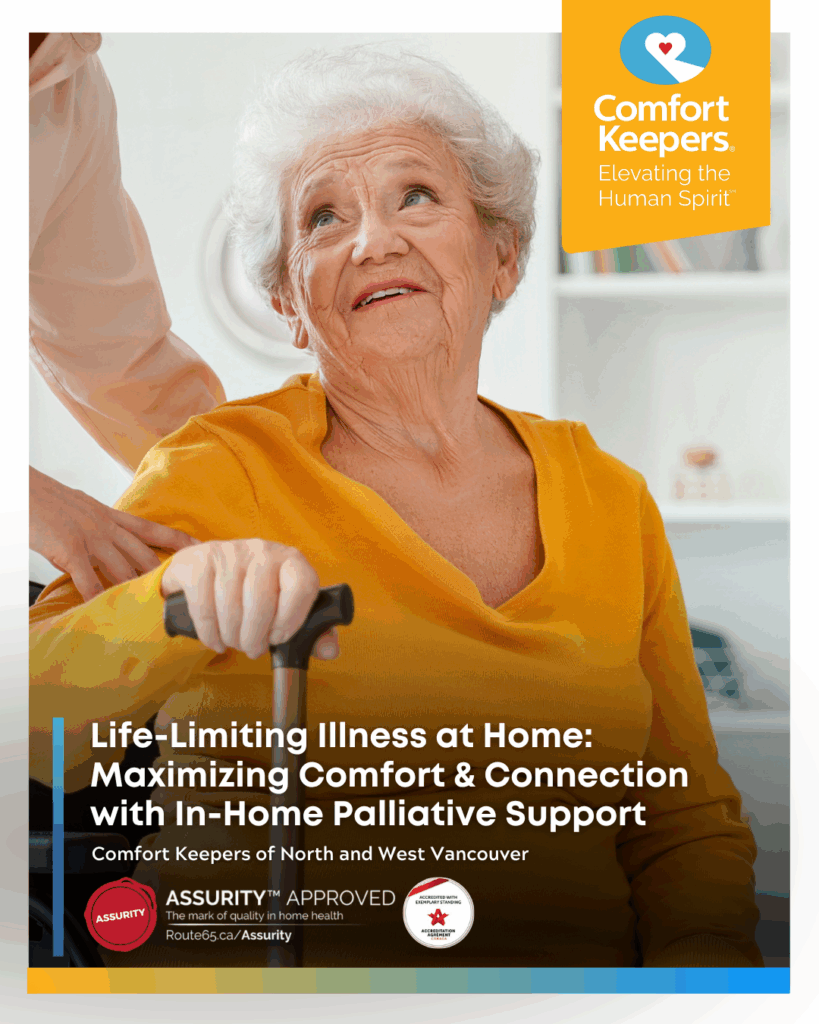Life-Limiting Illness at Home: Maximizing Comfort & Connection with In-Home Palliative Support
Senior In-Home Care | October 14, 2025
When a loved one is diagnosed with a life-limiting illness, your world shifts. The focus narrows to a single, profound question: How can we ensure they have the best quality of life possible, for as long as possible? You find yourself researching terms like “palliative support” and “comfort care,” but the clinical definitions often miss the human element you’re truly searching for.
You’re not just looking for medical management. You’re looking for a way to preserve dignity, nurture connection, and create meaningful moments in the place that feels most like home. This is the crucial intersection where true in-home palliative support goes beyond medicine to focus on the whole person.

Understanding the Language of Care: Palliative vs. Comfort vs. Hospice
Navigating healthcare terminology can be confusing, especially during an emotional time. Let’s clarify these key terms, as understanding the differences is the first step in making a confident decision.
Palliative Care:
This is specialized support for people living with a serious illness. The primary goal is to improve the quality of life for both the client and their family by providing relief from the symptoms and stress of the illness. A key point competitors often blur is that palliative care can begin at diagnosis and be provided alongside curative treatments. It is not just for the end of life.
Comfort Care:
This term is often used interchangeably with palliative care, but it emphasizes the goal of keeping someone comfortable rather than curing their illness. It’s a philosophy that underpins both palliative and hospice care, focusing on symptom and pain management to ensure peace and dignity.
Hospice Care:
This is a specific type of care that begins after treatment of the disease is stopped and when it’s clear the person is not going to survive the illness. Hospice is typically for individuals with a life expectancy of six months or less and focuses entirely on comfort and quality of life.
Think of palliative support as a broad umbrella of care focused on quality of life at any stage of a serious illness, while hospice is a specific type of palliative care for the final months of life.
The True Meaning of In-Home Palliative Support: A Holistic Approach
Effective palliative support at home isn’t a single service; it’s a coordinated approach built on four essential pillars. While many services focus only on the physical, a truly comprehensive plan addresses the needs of the whole person.
The Four Pillars of In-Home Support:
- Physical Comfort: This is the foundation. It involves expert management of pain, nausea, fatigue, and other symptoms to ensure your loved one is as comfortable as possible.
- Emotional & Psychosocial Well-being: A serious illness impacts more than the body. This pillar addresses feelings of anxiety, depression, and isolation for both the person receiving care and their family. It’s about providing companionship and emotional support.
- Spiritual Support: This is about honoring a person’s beliefs, values, and sense of meaning. It doesn’t have to be religious; it can be about finding peace, resolving relationships, or reflecting on a life well-lived.
- Practical Support: This is the logistical side of care that often becomes a heavy burden for families. It includes coordinating with doctors, managing complex medication schedules, and navigating the healthcare system.
More than half of adults in North America are living with at least one chronic condition, and millions are limited in their ability to leave home. This reality underscores the growing need for a support system that addresses all four of these pillars right where people want to be – at home.
Bringing Palliative Care Home: The Practical Guide Competitors Don’t Provide
Understanding the theory is one thing; implementing it is another. Families often feel overwhelmed trying to manage the day-to-day logistics. Here are practical steps to create a supportive home environment.
Coordinating with the Medical Team
Effective communication is crucial. Keep a dedicated notebook to track symptoms, questions for the doctor, and medication changes. When you have in-home support, your caregiver becomes a vital link, observing changes and providing detailed updates to ensure the entire medical team is on the same page.
Adapting the Home Environment
Small changes can make a huge difference in safety and comfort. Consider these simple adjustments:
- Clear Pathways: Remove clutter, rugs, and unnecessary furniture to create clear paths for walking or a wheelchair.
- Accessible Necessities: Keep frequently used items like the phone, remote control, water, and medications within easy reach of their favorite chair or bed.
- Comfortable Seating: Use pillows and cushions to support the back, neck, and limbs, relieving pressure and improving comfort.
Managing Complex Medication Schedules
Create a clear, written schedule for all medications. Use a pill organizer and set daily alarms as reminders. An in-home caregiver can provide crucial medication reminders, ensuring doses are taken safely and on time, which is a common source of stress for families.

The Comfort Keepers Difference: Interactive Caregiving™ for a Life-Limiting Illness
This is where we move from simply managing an illness to actively enhancing a life. Standard home care often focuses on tasks – what needs to be done for someone. Our philosophy of Interactive Caregiving™ focuses on what we can do with them.
For someone with a life-limiting illness, this approach is transformative. It’s about finding ways to bring moments of joy, purpose, and connection into each day.
Instead of just preparing a meal, our caregivers might involve your loved one in choosing the menu or sharing stories while they cook together. Instead of just ensuring they are safe, we engage them in their favourite hobbies, whether it’s listening to music, looking through old photo albums, or enjoying the view from a window.
This active engagement helps combat the depression and isolation that can accompany serious illness. It shifts the focus from what has been lost to the joy that can still be found, nurturing their mental and emotional well-being. Our caregivers are trained to provide a full range of in-home companionship and care services, from personal hygiene to light housekeeping, all through the lens of Interactive Caregiving™.
Supporting the Supporters: A Guide for Family Caregivers
We understand that a life-limiting illness affects the entire family. Family caregivers often experience immense stress, grief, and burnout. You cannot pour from an empty cup. It’s not selfish to take care of yourself; it’s essential.
- Accept Help: When friends or family offer to help, accept it. Have a list of specific tasks ready, like picking up groceries or sitting with your loved one for an hour, so you can take a walk.
- Seek Respite: Professional respite care provides short-term relief for primary caregivers. Even a few hours a week to run errands, attend an appointment, or simply rest can make a significant difference.
- Acknowledge Your Feelings: It’s okay to feel sad, angry, or overwhelmed. Find someone you can talk to – a friend, a support group, or a professional.
Partnering with an in-home care provider isn’t just about getting help for your loved one; it’s about getting support for you, too. We see ourselves as a partner to the whole family.
Your Questions About In-Home Palliative Support Answered
Is palliative care the same as giving up?
Absolutely not. This is a common misconception. Palliative care can be provided at any stage of a serious illness, even while pursuing aggressive, curative treatments. The goal is to improve the current quality of life by managing symptoms and stress.
Can we really manage complex care needs at home?
Yes. With the right support system, home is often the best place to receive care. A combination of skilled medical care from doctors and nurses, paired with the holistic support of professional in-home caregivers, can create a safe, effective, and comforting environment.
How is in-home palliative support paid for?
Coverage varies. Some aspects may be covered by provincial health services, while others may be covered by private insurance or paid for out-of-pocket. We can help you navigate these options during a consultation to create a plan that fits your family’s needs.
When is the right time to start considering in-home support?
The best time to start the conversation is sooner rather than later. Introducing support before you reach a crisis point allows for a smoother transition and helps prevent caregiver burnout. It’s about adding a layer of support, not waiting until you’re overwhelmed.
How to Get Started with In-Home Palliative Support
Taking the first step is often the hardest part. We make it simple and stress-free.
- Initial Conversation: Call our North & West Vancouver office. You’ll speak with a compassionate care coordinator who will listen to your story and answer your initial questions.
- In-Home Assessment: We schedule a no-obligation meeting in your home to understand your loved one’s unique needs, personality, and home environment. This is a crucial step in creating a truly personalized care plan.
- Caregiver Matching: We carefully match your loved one with a caregiver whose skills, personality, and experience are the right fit for your family.
- Care Begins: We work with you and your medical team to implement the care plan, with ongoing communication and adjustments as needs change.
Your journey is unique, and your care plan should be too. Whether you need assistance with personal care services or more comprehensive support, we are here to help.
Choosing a partner for this journey is one of the most important decisions you’ll make. You need more than just a service; you need a team that understands the local North Shore community and is committed to providing care with the dignity and respect you’d show your own family. Let’s talk about how we can help you find comfort, preserve connection, and bring daily moments of joy back into your home.
The Best Senior Home Care in North and West Vancouver is Comfort Keepers®
Our senior home care agency offers in-home care focusing on aging in place. Our services include dementia care, end-of-life care, post-surgery care, and palliative care. Comfort Keepers can assist seniors with living transition services, personal care, companionship care, and more!
Quality and Accredited Elderly Care: Happier, Healthier, and at Home with 24/7 Senior Care Opportunities!
Do you need a home care solution for yourself or a loved one? Have you been thinking about retirement homes and their alternatives as a solution? Comfort Keepers® enables seniors to maintain happy, healthy lives in the comfort of their own homes. In-home care services are available in North Vancouver, West Vancouver, and the surrounding areas.
Comfort Keepers® is a Senior Care Agency That Can Make a Difference with Interactive Caregiving™
Our in-home caregivers ensure our senior clients have the best quality of life. The Interactive Caregiving™ program ensures that a senior’s safety, nutrition, mental well-being, and everyday needs are met. This program brings joy and good health to each client’s home.
Comfort Keepers® North Vancouver and West Vancouver Can Help with In-Home Elderly Care Services!
If you are concerned about the health and well-being of a loved one we can help! Comfort Keepers offers 24-hour care and delivers top-quality and compassionate care for seniors. We are dedicated to safety technology solutions that foster independence and enhance well-being.
Locally Owned and Operated Home Health Care Agency
Our care centers around companionship for seniors. Empathetic care originates from the soul and allows us to meet our client’s requirements. The seasoned in-home caregivers employed by Comfort Keepers are carefully chosen based on their empathetic qualities.
Contact the Comfort Keepers® North Vancouver and West Vancouver office at (604) 998-8806 to learn more about our unique in-home care solutions for seniors.
Comfort Keepers is an Accredited Senior Care Agency in North and West Vancouver, BC
Accreditation is a rigorous process that involves industry experts evaluating an organization’s processes, policies, and procedures. Comfort Keepers® North and West Vancouver has been awarded Exemplary Standing by Accreditation Canada. This achievement recognizes that Comfort Keepers® meets or exceeds the stringent quality standards for Home Care companies established by Accreditation Canada.
Individualized Home Care Options
Long-Term Home Care, 24 Hour Home Care & Short Term Care Options Customized for You





